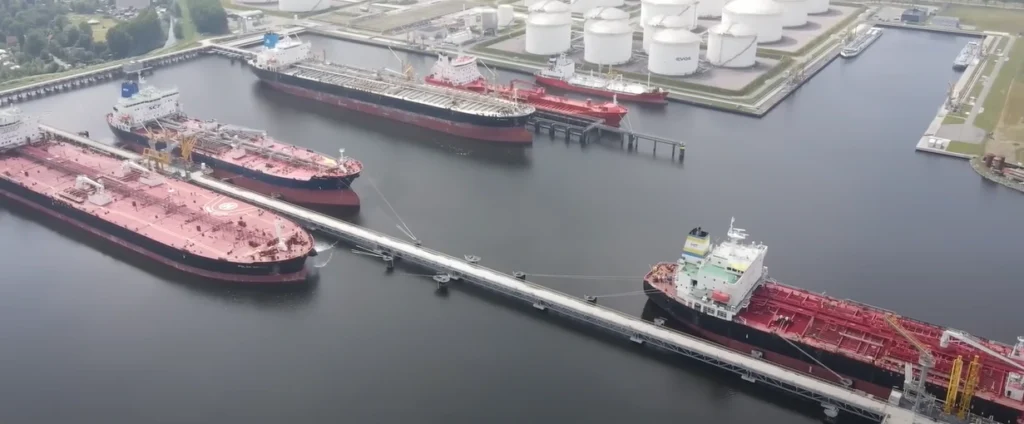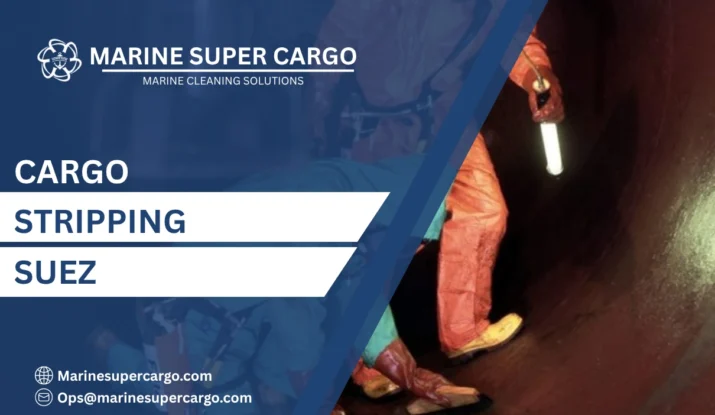Cargo stripping Suez operations form a critical preparatory phase before comprehensive tank cleaning procedures. Effective cargo stripping Suez ensures maximum cargo discharge and minimizes residue quantities requiring subsequent cleaning. Marine Super Cargo delivers professional cargo stripping Suez services that optimize vessel operations and reduce overall cleaning costs.
Understanding Cargo Stripping Procedures
Cargo stripping Suez involves systematically removing remaining liquid cargo after primary discharge operations complete. The process utilizes specialized pumping equipment and techniques to extract cargo from low points and corners. Marine Super Cargo employs experienced personnel who understand tank geometries from bow to stern.
Cargo stripping operations align with MARPOL Annex I requirements for minimizing oil retention onboard. Proper stripping reduces the quantity of cargo residues classified as waste under IMO guidelines. This compliance benefits both environmental protection and operational economics.
Equipment and Techniques for Effective Stripping
Portable stripping pumps provide flexibility for accessing difficult areas within cargo tanks. These specialized units handle high-viscosity products and operate effectively in confined spaces. Marine Super Cargo maintains comprehensive stripping equipment suitable for various cargo types.

Benefits of Thorough Cargo Stripping
Comprehensive cargo stripping Suez significantly reduces subsequent tank cleaning costs. Less residue means shorter tank cleaning duration, lower water consumption, and reduced waste disposal expenses. Marine Super Cargo emphasizes stripping efficiency to benefit our clients financially.
Reduced residue quantities minimize environmental impact during subsequent cleaning operations. Lower waste generation aligns with MARPOL regulations emphasizing pollution prevention. This environmental stewardship supports sustainable maritime operations.
Cargo-Specific Stripping Considerations
Petroleum product stripping requires temperature management to maintain cargo fluidity. Heavy fuel oils benefit from heating systems that reduce viscosity during stripping operations. Marine Super Cargo coordinates with vessel crews to optimize cargo temperature for maximum recovery.
Chemical cargo stripping demands careful attention to product characteristics and safety requirements. Certain chemicals require inert gas blanketing during stripping operations. Our personnel understand MARPOL Annex II requirements for chemical tanker operations.
Vegetable oil stripping presents unique challenges due to product characteristics. Temperature control prevents solidification while stripping operations proceed. Similar to our tank cleaning machine services, stripping procedures adapt to specific cargo properties.
Integration with Tank Cleaning Operations
Cargo stripping Suez directly influences subsequent tank cleaning efficiency. Thorough stripping reduces the volume of residues requiring removal through hot water or cold water cleaning. Marine Super Cargo coordinates stripping and cleaning operations for optimal results.
The transition from stripping to cleaning requires careful planning and execution. Stripping operations must complete before gas-freeing procedures commence. Our systematic approach ensures proper sequencing of all operational phases.
Safety and Regulatory Compliance
Cargo stripping operations require strict adherence to safety protocols. Enclosed space entry procedures protect personnel accessing tanks for manual stripping activities. Marine Super Cargo maintains comprehensive safety management systems meeting IMO MEPC standards.
Documentation of stripping quantities supports proper waste management planning. Accurate records enable compliance with port state control requirements and environmental regulations. Our comprehensive reporting satisfies all regulatory documentation needs.
Cost-Effective Stripping Solutions
Marine Super Cargo offers competitive pricing for cargo stripping Suez services. Our efficient operations minimize costs while maximizing cargo recovery. The return on investment from improved cargo outturn typically exceeds stripping service expenses.
Our integrated approach combining stripping with tank cleaning services provides economies of scale. Vessels benefit from coordinated operations and streamlined logistics. Single-source service provision simplifies coordination and reduces overall costs.
Conclusion
Cargo stripping Suez services from Marine Super Cargo maximize cargo recovery while preparing vessels for efficient tank cleaning operations. Our professional approach combines experienced personnel, specialized equipment, and systematic procedures to deliver optimal results. Contact us for comprehensive cargo stripping solutions that enhance vessel operations and reduce overall costs in Suez.
FAQs
Q1: How much additional cargo can stripping operations recover?
Professional stripping typically recovers an additional 0.5-2% of cargo volume depending on product viscosity, tank design, and stripping technique employed. This translates to significant value for most cargoes.
Q2: Is cargo stripping required before tank cleaning?
While not always mandatory, stripping is highly recommended and often required by charterers. It maximizes cargo recovery, reduces cleaning costs, and minimizes waste disposal expenses significantly.
Q3: How long do cargo stripping operations take?
Stripping duration varies from 4-12 hours per vessel depending on number of tanks, cargo characteristics, and residue quantity. Marine Super Cargo optimizes efficiency to minimize vessel detention.
Q4: Can stripping be performed simultaneously with tank cleaning preparation?
Yes, stripping operations can proceed while preparing other tanks for cleaning. Our crews coordinate activities to maximize efficiency and reduce overall turnaround time in port.
Q5: What happens to cargo recovered during stripping operations?
Recovered cargo is typically returned to shore tanks for sale or redelivery to cargo owners. This cargo retains commercial value unlike residues removed during subsequent tank cleaning.


